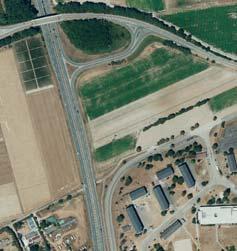
11 minute read
Location Rhine-Neckar
Place for innovation

Advertisement


The Rhine-Neckar region – progressive, committed and livable


























948.000 billion 160,000 More than staff and generate a gross added value of companies employ a total of billion staffand generate a gross added value o € 89
The Rhine-Neckar Metropolitan Region is both innovative and dynamic with an excellent scientific landscape, vibrant cultural life, attractive residential and shopping areas, and stunning natural environment. Its 2.4 million inhabitants are proud of their strong tradition of civic commitment.




Photo: Fulbert Hauck
With a per capita GDP of around €39,000 and a gross value added of €89 billion, the region is one of Germany's leading economic centres. As an international hub, its 15 urban and rural districts offer companies fast access to people, markets and knowledge. They are home to listed companies, such as BASF, SAP, Roche, Heidelberger Druckmaschinen and HeidelbergCement with a combined market capitalisation of €231.4 billion. The unemployment rate has been falling for years in the Rhine-Neckar region; it now stands at just 4.3 percent.
Innovation Space for Technology The Rhine-Neckar Metropolitan Region is one of the most innovative areas in Europe. It is the northern gateway to the Technology Axis South, which generates 32 percent of total industrial turnover and 43.3 percent of all German patents. In the Rhine-Neckar region itself, more than 2.3 percent of employees work in research and development – considerably more than the national average of 1.2 percent.
Two new science data centres in Mannheim and Heidelberg will soon enable scientists to work more closely with computer centre and library staff in order to improve the usability of research data. The Business and Economic Research Data Center (BERD-BW) in Mannheim will be a centre of expertise for data availability, data exchange and data analysis in the economic sciences. Heidelberg’s “BioDATEN – Bioinformatics DATa Environment” centre focuses on research in the life sciences and will support bioinformatics workflows throughout the entire data life cycle.
Heidelberg’s InnovationLab research centre coordinates the interdisciplinary, state-ofthe-art research and development activities of the Forum Organic Electronics cluster.





Regional and local digitisation Artificial intelligence (AI) is a key factor in digitisation. The AI4EU project aims to create a new platform for artificial intelligence that will support potential users of the tech
The region’s success is based on three key pillars: innovation, outstanding workforce and excellent infrastructure.
nology, help them to test AI solutions and integrate them into their processes, products and services. A total of 21 countries are participating in the project, which includes the Walldorf-based company SAP among its partners. A new test environment for 5G applications in medical technology at the University Hospital in Mannheim will offer assistance for SMEs. This is part of the project “Transfer Centre 5G for SMEs” which was set up by the Fraunhofer Institute's Project Group for Automation in Medicine and Biotechnology and funded by the Federal Ministry of Transport and Digital Infrastructure. “We create community²” is the motto of the digitisation strategy developed in partnership between the City of Mannheim and its citizens. It is embedded in the Mannheim 2030 mission statement and aims to promote
6 the further development of future Smart City activities. Mannheim and the District of Rhine-Neckar are also participating in the “Smart Cities” call for tenders issued by the Federal Ministry of the Interior. The goal is to create an open xRoad platform that networks decentralised registers, integrates further stakeholders and creates a uniform data standard. Regional planning and development also require a solid base of usable data. The newly conceived spatial observation system “Metropolitan Atlas Rhine-Neckar” – a free-to-use, web-based application – allows users to visualise information for more than 200 indicators in the form of diagrams and maps using official statistics or crowd-based data. The project plans to successively integrate further data sources into the Metropolitan Atlas Rhine-Neckar and create a comprehensive and cooperative data infrastructure.
Intelligent networks for education In the age of globalisation and digitisation, few things are more important for a region’s long-term prosperity than strong education and training. For this reason, the RhineNeckar Metropolitan Region is networking its various educational stakeholders under the label “EduAction”. This will also create greater transparency with regard to the region’s many private education companies. Twenty-two universities and around 30 internationally renowned research institutions successfully drive innovation by transferring research results into economic valueadded processes. In 2019, the University of Heidelberg
was again awarded the title “University of Excellence”. It is regularly one of the top German universities in international rankings. However, not only scientists, but also students praise the region’s education infrastructure. For example, the study “Location Retention of Young Talent and Junior Staff” conducted by the Spiegel Institute Mannheim shows that students at the University of Mannheim are satisfied with their quality of life and education in the city: Mannheim is the preferred place to study for 68 percent of those surveyed. They also rate the region’s infrastructure, shopping facilities, cultural and leisure activities as good to very good.
Energy systems of the future Hydrogen has the potential to significantly reduce damaging greenhouse gases and improve air quality – especially if it is generated from renewable resources. The Rhine-Neckar Metropolitan Region aims to become a model region for the innovative use of hydrogen. It is receiving €20 million in funding from the German federal government to implement its concept for the networked expansion of hydrogen use. One specific example of a sustainable energy supply solution is being implemented under the title “blue_village_franklin” at the Franklin
Europe will only be able to exploit the benefits of AI if the technology is easy for all companies to use.
conversion site Mannheim. The concept is based on cellular energy systems and has been included in the nationwide initiative “Showcase Intelligent Energy – Digital Agenda for the Energy Turnaround” (SINTEG) run by the Federal Ministry of Economics and Energy as part of its novel “C/sells” energy concept. Together with innovative services, the project aims to create a pioneering energy community. The first hydrogen filling stations have been in operation in Heidelberg since the beginning of 2019. Heidelberg's municipal authority is planning to gradually convert its fleet of vehicles to meet zero-emission standards. The changeover will follow the schedule defined in the master plan “Sustainable Mobility for the City”, developed by Heidelberg, Mannheim and Ludwigshafen.
2.3 % of employees in R&D 16.7 % of employees in high-tech industries
A pioneering energy storage solution operated by Heidelberger Stadtwerke boosts the fl exibility of the town’s energy supply.

Mainz Frankfurt am Main
Darmstadt
Main
fast cycle path from Mannheim to Heidelberg currently in the planning phase 22 km
Ludwigshafen am Rhein
Mannheim
Heidelberg
Neckar
Rhein
Heilbronn
Karlsruhe
Pforzheim Mannheim main railway station – Paris 2:59 h
Mobility services in residential areas are vital for promoting sustainable travel and climate protection.
Stuttgart Making the leap to sustainable mobility Climate protection will not succeed without greater sustainability in the transport sector and more intensive cooperation. Under the coordination of the regional association Verband Region Rhein-Neckar, the metropolitan region is therefore launching a mobility pact which will develop an integrated concept for the region's transport requirements. This will focus not only on optimising large-scale traffic direction systems and company mobility management, but also on strengthening local public transport, cycling and long-term infrastructure requirements. To reduce the volume of traffic searching for parking spaces and improve air quality, the City of Mannheim is installing a modern, digital parking guidance system. It will use state-of-the-art collection and provision of data to detect and communicate parking capacities and occupancy rates virtually in real time. It will also include the locations and occupancy rates of charging stations for electric vehicles. In addition, sustainable mobility will require investment in autonomous vehicles. “Real Laboratory for Automated Bus Services in Urban and Rural Public Transport (RABus)” – a project set up by the Baden-Wuerttemberg Ministry of Transport and an interdisciplinary consortium of research institutes, user
groups and technology suppliers, including Rhein-NeckarVerkehr GmbH, the region’s public transport provider – aims to test the practical feasibility of the mobility solution.
Conversion as a strategy As Germany transforms itself from an industrial to a knowledge-based society, its land use and real estate requirements are also changing. The Heidelberg Innovation Park (hip) is under construction on the site of the former Patton Barracks and is set to become an innovation hot spot for IT, digital media and bioinformatics. This crucible of ideas for the digital future will promote interdisciplinary exchange between users, provide space for companies at all stages of their development and create up to 6,000 jobs.
In Weinheim, following the relocation of the GRN care centre and rehabilitation clinic, a new residential apartment complex is currently in the planning phase. The historic chapel of the “Kreispflege” (district care centre) will be preserved, as will the Wilhelminian-style ward block and listed administration building. In Mannheim, a building at the former Taylor Barracks has been extensively renovated and converted into “das E” complex, which includes both offices and a hotel. The City of Mannheim acquired the 45-hectare site in 2013 and is converting it into a campus-style industrial park with a long belt of landscaped parkland at its heart.
International presence In its “Vision 2025”, Rhine-Neckar described its goal of being well-known and recognised as one of the most attractive and competitive regions in Europe. Key focuses of this regional development strategy include sustainable and needs-based mobility, cooperation and positioning in Europe, ensuring a healthy balance between settlement development and open spaces, promotion of regional innovation activities and an intelligently networked health region. Mannheim was the first German city to establish a structured partnership with UN-Habitat to promote sustainability goals. The city is also aligning its development strategy with the 17 “Sustainable Development Goals” (SDGs) of the United Nations. In addition, Worms and Speyer are working towards achieving “UNESCO World Heritage” status as important sites in Ashkenazi Judaism.
Bauhaus architecture in Mannheim
Last year, the Bauhaus celebrated its 100th birthday. The now world-famous name was coined by Walter Gropius, who founded the “Staatliches Bauhaus” in Weimar on April 1, 1919. This avant-garde school has had a major influence on art, design and architecture – and Mannheim is no exception. Bauhaus developed the idea of standardising building components and reducing costs through reduction and simplification of designs. When the school in Weimar closed at the end of 1924, Gropius searched for a new location and contacted the Mayor of Mannheim, Theodor Kutzer. However, Mannheim lacked the financial resources to set up a similar institution. Nevertheless, Bauhaus architecture did find its way into the city. The first example appeared in 1927 with the “Fröbel-Seminar” in the Lindenhof district, which was built according to plans of the municipal building construction office. Many elements of the Bauhaus can also be found in the New Mannheim National Theatre, which was designed by Bauhaus student Gerhard Weber and built between 1955 and 1957. Detailed information on the Bauhaus in Mannheim can be found in the brochure “Bauhaus Architecture” by Dr. Monika Ryll, published by the association Rhein-Neckar Industriekultur.
www.rhein-neckar-industriekultur.de/ bauhaus-architektur
The National Theatre is undergoing extensive renovation.









